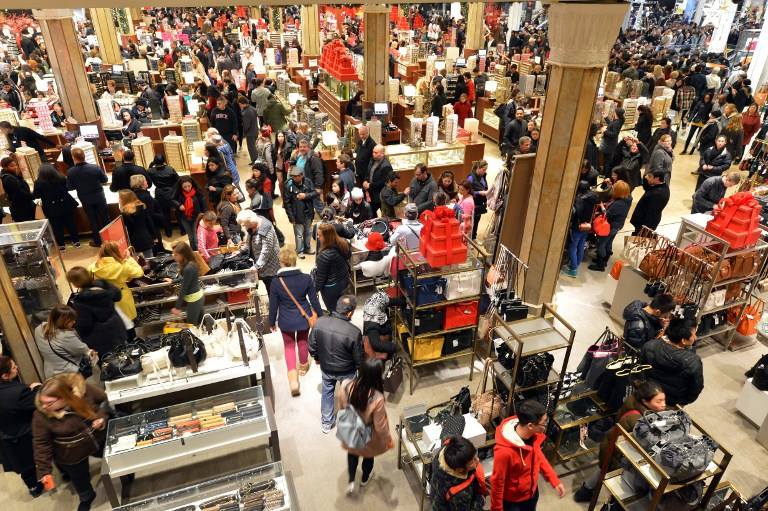Black Friday: Convenience vs. Tradition
Weekly Update
Crowded Stores on Black Friday
November 30, 2016
Now that Thanksgiving is over and many Americans are officially stuffed, the holiday season can begin. The winter holidays kick off with a day called Black Friday, when retailers offer deals on their goods to spark business through an early start of holiday gift shopping. It makes sense that the name “Black Friday” would relate to the term “going into the black,” which means making a profit. However, this is not the true origin of the name; in the 1950s, Philadelphia police officers used the term to describe the chaos that occurred on the day after Thanksgiving, when hordes of shoppers fell upon malls and stores to take advantage of the sales that were offered. Philadelphians liked the term, and soon its negative connotation was forgotten.
Despite the rather distressing past of Black Friday, the tradition has persisted throughout the years. The custom of starting your Christmas shopping the day after Thanksgiving remains in practice. However, the landscape on which people are shopping is changing. CNBC reporter Andrew Kelly wrote: “A staggering amount of that buying took place on the internet, data showed, setting a sales record. It’s underscoring how retailers have aggressively integrated web bargains into their holiday marketing strategy.” The national shopping method is changing, causing a decrease in the number of people who actually go to stores to shop. According to the Washington Post, in 2015, 151 million people went to stores to shop for Black Friday sales over the weekend. However, in 2016, according to a CNBC report, only 137.4 million people shopped in stores. Though many people still prefer stores as their method of shopping, that is changing. Alonia Needs ’19 commented: “I prefer shopping in stores to get the full experience, but it’s never like how I would like it to be. I want it to be like how it is in the movies, tons of people running around and stuff.” A decrease in this store-shopping frenzy shows how the national mode of shopping is changing.
The national shift in the way we shop is present on a local scale as well as national. According to a poll I conducted in the sophomore class, 23% more people shopped online than in stores. Tristan Pantano ’19 commented: “I prefer to go Black Friday shopping online. It is more convenient. . . I think the development of this new way of shopping is going to change how people shop on Black Friday. Instead of overcrowded stores, there’s going to be too many people on websites, making them run slower. There’s going to be different kinds of hassles surrounding Black Friday shopping.” Though there are some downsides to shopping online, there are some upsides too. Jake Rashkind, English Department, commented: “I don’t see how it could be a bad thing. I think you will have fewer people on the road, which means less gas is being used and fewer accidents will occur. There will be fewer mobs of people trampling each other in stores. Online shopping seems like a smart way to go these days.”
The internet has taken the world of shopping by storm. With the current increase in this method of shopping, Black Friday will be safer, more convenient, and better for the environment. However there are also downsides to this manner of shopping. While online alternatives may be safer and more efficient, the stream of people visiting websites to shop will inevitably make the websites slower and more difficult to use. While the tradition of Black Friday lives on, despite its troublesome roots, the way we will go about it in the future is undecided. The nature of Black Friday is changing, but hopefully the tradition will live on.
Works Cited
Pruitt, Sarah. “What’s the Real History of Black Friday?” History.com. A&E Television Networks,
24 Nov. 2015. Web. 28 Nov. 2016. http://www.history.com/news/whats -the-real-history-of-black-friday
David, Javier E. “‘Incredible’ Black Friday Deals Pulled in More Shoppers, Who Spent a Record
Amount Online.” CNBC. CNBC, 27 Nov. 2016. Web. 28 Nov. 2016.
http://www.cnbc.com/2016/ 11/27/black- friday-deals-pulled-in-more-shoppers-but-they-spent-less-nrf-data-shows.html
Halzack, Sarah. “151 Million People Shopped over Black Friday Weekend.” Washington Post.
The Washington Post, 29 Nov. 2015. Web. 28 Nov. 2016. https://www.washingtonpost.com/ news/business/wp/2015/11/29/151-million-people-shopped-over-black-friday-weekend/
Beskrone, Carlin A. 28 Nov. 2016. Raw data. Wilmington DE, Wilmington.































